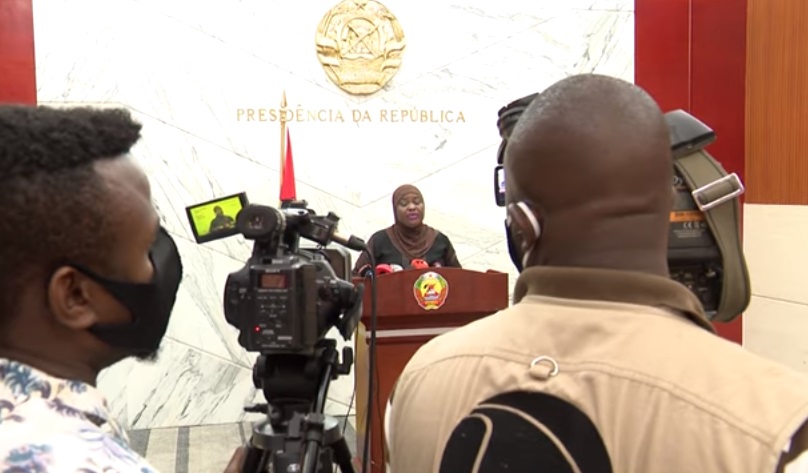Mozambique: Health workers threaten to intensify strike
Mozambique: New minimum wages announced: first wage rise in two years – Watch

Photo: TVM
The Mozambican government on Thursday approved new minimum wages, taking effect as from 1 August.
Speaking to reporters after a meeting of the Council of Ministers (Cabinet), Labour Minister Margarida Talapa said the increases in the minimum wages reflect consensus achieved at the Labour Consultative Commission (CCT).
The CCT is the tripartite negotiating body between the government, the trade unions and the employers’ associations. Normally, the CCT negotiates the minimum wages in the first quarter of the year, and they take effect from 1 April.
But the 2020 session of the CCT was interrupted because of the Covid-19 pandemic, and it only resumed its work in late June this year. Thus the last time the minimum wage was increased was in April 2019. Mozambican workers have endured a wage freeze for more than two years.
There is no longer a national minimum wage. Instead, wages are negotiated on a sectoral basis, and there are now 18 sectors and sub-sectors. The increases this year range between 1.5 and 8.7 per cent.
The rises in the monthly minimum wage announced by the government, sector by sector, are as follows. The previous wage is shown in brackets.
1. Agriculture, hunting and forestry – 6.9 per cent: 4,829 meticais, equivalent to 75.4 US dollars at current exchange rates (previously: 4,390 meticais).
2. Industrial and semi-industrial fishing – 3.7 per cent: 5,570 meticais (previously: 5,370 meticais)
a) The Kapenta (Lake Tanganyika sardine) fishery on the Cahora Bassa reservoir in Tete province – 3.2 per cent: 4,401 meticais (previously, 4.266 meticais)
3. Mining – 6.4 per cent: 9,843 meticais (previously, 9,254 meticais)
a) Quarries and sandpits – 3.2 per cent: 6,580 meticais (previously, 6,379 meticais)
b) Salt pans – 5.1 per cent, 5,589 meticais (previously, 5,318 meticais).
4. Manufacturing industry – 6.4 per cent: 7,450 meticais (previously, 7,000 meticais).
a) Bakeries – 7 per cent, 5,350 meticais (previously, 5,000 meticais).
b) Cashew industry – 8.7 per cent: 5,010 meticais (previously 4,610 meticais)
5. Electricity, gas and water, large companies – 7.2 per cent, 8,900 meticais (previously, 8,300 meticais).
a) Small companies – 7.2 per cent, 7,246 meticais (previously, 6,760 meticais).
6. Building industry – 3.2 per cent, 6,331 meticais (previously, 6,136 meticais).
7. Non-financial services – 6.6 per cent, 7,300 meticais (previously, 6,850 meticais)
a) Hotel industry – 1.5 per cent, 6,578 meticais (previously, 6.478 meticais).
8. Banking, insurance and other financial services – 7.25 per cent, 12,760 meticais (previously, 11,897 meticais)
a) Micro-finance – 5.1 per cent, 13,409 meticais (previously, 12,760 meticais)
9. Public sector employees – five per cent, 4,691 meticais (previously 4,368 meticais).
The five per cent increase for the public sector covers all levels of the public administration.
Talapa claimed that these increases, far lower than the unions had hoped for, reflect the current moment that Mozambique is passing through, characterised by a low level of production and productivity, because of the negative impact of Covid-19, the terrorist attacks in the northern province of Cabo Delgado, the armed raids in Manica and Sofala provinces, carried out by the self-styled “Renamo Military Junta”, and also the aftermath of cyclones Idai and Kenneth which hit the country in 2019.
“I would like to stress that these increases in the minimum wages are certainly not what is desirable”, said the Minister. “But they are what is possible taking into consideration the current economic and social conjuncture of the country”.
For the private sector, the government only sets the minimum wage. All wages above the minimum are negotiated between the employers and the unions.
Watch the TVM report.













Leave a Reply
Be the First to Comment!
You must be logged in to post a comment.
You must be logged in to post a comment.